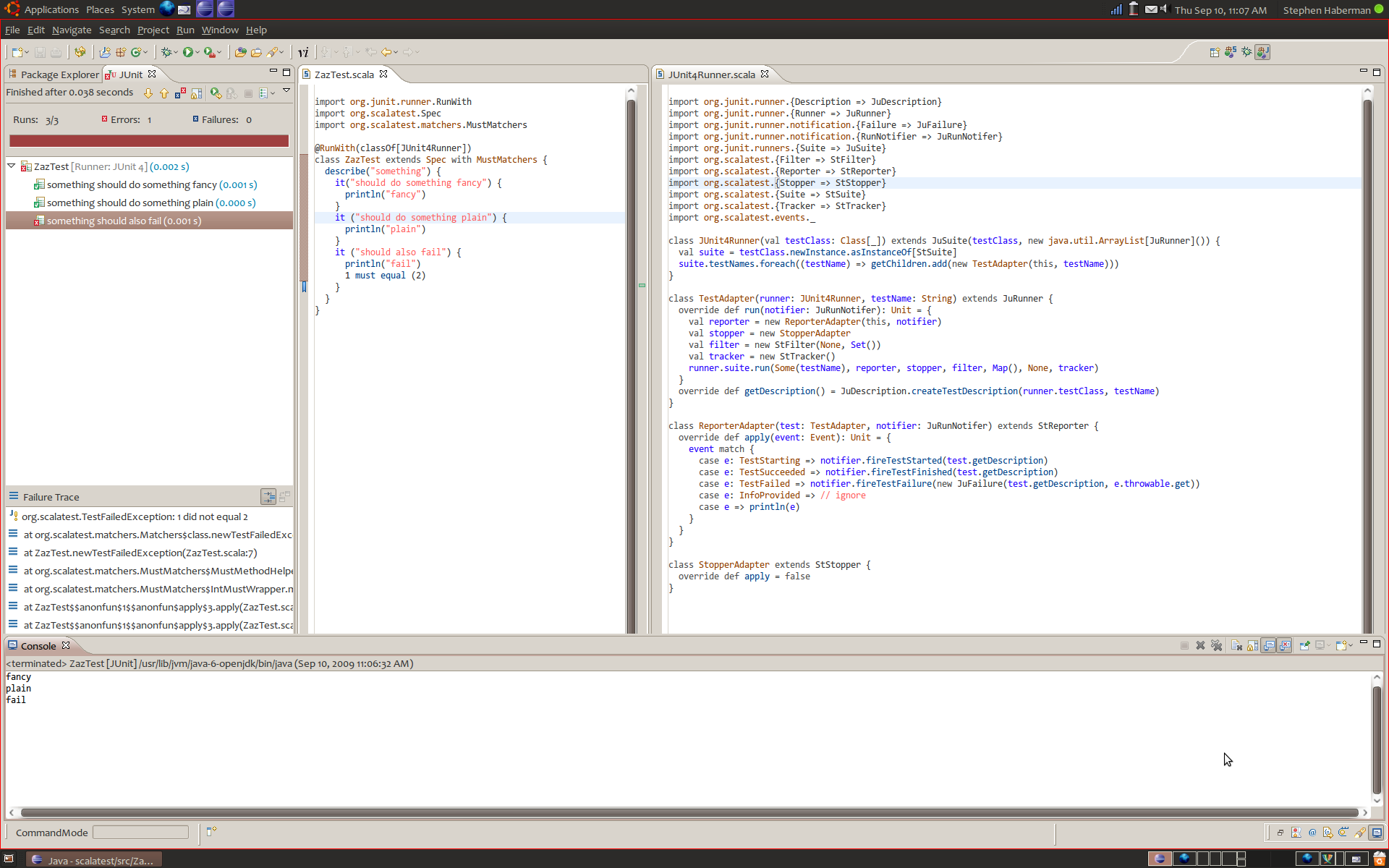Running ScalaTest Spec Tests from Eclipse
ScalaTest is pretty cool. I’ve been playing with the “spec” way of writing tests—for the most part, I have nothing against traditional JUnit 3 testXxx methods, other than having string-based test names is pretty darn cool from a readability perspective.
The big con, however, is that ScalaTest doesn’t have its own Eclipse plugin, so if you move away from the JUnit 3 testXxx methods, you don’t get the nice Alt-Shift-X + T test-running capabilities directly within Eclipse.
I started fiddling with ways of tricking Eclipse into running spec-type ScalaTests and came up with a workable approach.
A Sample Test
So, here’s a sample spec-based test that we’d like to run with Eclipse:
import org.junit.runner.RunWith
import org.scalatest.Spec
import org.scalatest.matchers.MustMatchers
@RunWith(classOf[JUnit4Runner])
class ZazTest extends Spec with MustMatchers {
describe("something") {
it("should do something fancy") {
println("fancy")
}
it ("should do something plain") {
println("plain")
}
it ("should also fail") {
println("fail")
1 must equal (2)
}
}
}Note the "should do something fancy" test names that JUnit really isn’t going to understand (because they are not methods, they’re anonymous inner classes ScalaTest keeps track of in an internal data structure).
How To Get Eclipse To Run This Test
The key thing I’ve added above is a RunWith annotation that uses a JUnit4Runner I wrote. When you hit Alt-Shift-X + T in Eclipse, even though ZazTest doesn’t extend TestCase or have any @Test annotations, the Eclipse JUnit 4 runner seems the RunWith annotation and hands over control to it.
The JUnit4Runner then just has to translate a JUnit run into something the Spec suite can handle.
This turned out to be not that bad:
import org.junit.runner.{Description => JuDescription}
import org.junit.runner.{Runner => JuRunner}
import org.junit.runner.notification.{Failure => JuFailure}
import org.junit.runner.notification.{RunNotifier => JuRunNotifer}
import org.junit.runners.{Suite => JuSuite}
import org.scalatest.{Filter => StFilter}
import org.scalatest.{Reporter => StReporter}
import org.scalatest.{Stopper => StStopper}
import org.scalatest.{Suite => StSuite}
import org.scalatest.{Tracker => StTracker}
import org.scalatest.events._
class JUnit4Runner(val testClass: Class[_]) extends JuSuite(testClass, new java.util.ArrayList[JuRunner]()) {
val suite = testClass.newInstance.asInstanceOf[StSuite]
suite.testNames.foreach((testName) => getChildren.add(new TestAdapter(this, testName)))
}
class TestAdapter(runner: JUnit4Runner, testName: String) extends JuRunner {
override def run(notifier: JuRunNotifer): Unit = {
val reporter = new ReporterAdapter(this, notifier)
val stopper = new StopperAdapter
val filter = new StFilter(None, Set())
val tracker = new StTracker()
runner.suite.run(Some(testName), reporter, stopper, filter, Map(), None, tracker)
}
override def getDescription() = JuDescription.createTestDescription(runner.testClass, testName)
}
class ReporterAdapter(test: TestAdapter, notifier: JuRunNotifer) extends StReporter {
override def apply(event: Event): Unit = {
event match {
case e: TestStarting => notifier.fireTestStarted(test.getDescription)
case e: TestSucceeded => notifier.fireTestFinished(test.getDescription)
case e: TestFailed => notifier.fireTestFailure(new JuFailure(test.getDescription, e.throwable.get))
case e: InfoProvided => // ignore
case e => println(e)
}
}
}
class StopperAdapter extends StStopper {
override def apply = false
}It basically just translates ScalaTest Events into JUnit RunNotifier events.
The Results
Here’s a screenshot:

What’s really cool is that, in typical JUnit fashion, no existing Run Configuration needs to be setup. E.g. I don’t have to manually create a run configuration for each spec-based ScalaTest—just hitting Alt-Shift-X + T will make a new JUnit run configuration and fire off the tests.
The Downside
The Eclipse JUnit UI still assumes “something should do something fancy” is a method name, so if you double click on it, it will fail to find it and just take you to the ZazTest class. So it’s not as easy to jump right to failures.
Bonus
Turns out you can right click and run individual it tests too. I have no idea how that is working—and it doesn’t seem to be just a UI trick, because the console output from the other tests doesn’t show up either. Weird…but cool.
Anyway, I haven’t decided if I’ll completely jump ship on traditional TestCase-extending tests for Scala projects. There is a warm familiarity that I like about it. But if I do start writing more spec-based ScalaTests, this RunWith hack will be very handy.
Update
Turns out this feature already exists in ScalaTest trunk and should be in the next release as org.scalatest.junit.JUnitRunner.